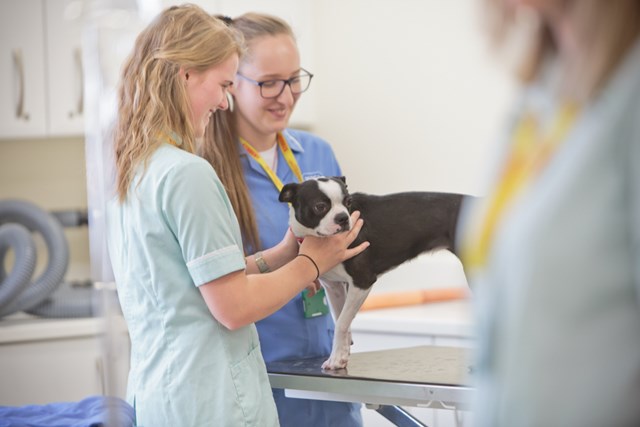Myerscough partners with UCLan to create prestigious Veterinary School
- Published
- Tuesday 22 Jun 2021
Myerscough College and University Centre is partnering with the University of Central Lancashire to create the county’s first Veterinary School.

The opening will see the provision become the 11th Veterinary School in the UK and Lancashire’s first.
The new Veterinary School will deliver foundation, undergraduate and postgraduate courses in areas such as veterinary medicine, bioveterinary science, veterinary clinical practice, veterinary physiotherapy and rehabilitation, and clinical animal behaviour and training.
UCLan is collaborating with Myerscough College and local veterinary partners to deliver certain programmes of study. Students will benefit from Myerscough’s renowned animal training facilities which have underpinned their established Royal College of Veterinary Surgeons (RCVS) accredited vet nursing programmes, alongside UCLan’s experience of establishing leading UK medical, dental, pharmacy and optometry schools with significant and continuing investment in state-of-the-art clinical training facilities.
Alison Robinson, Chief Executive and Principal at Myerscough College and University Centre, said: “Myerscough College and University Centre Myerscough is delighted to be working in collaboration with the University to open this prestigious new veterinary school.
‘’Myerscough has been delivering land-based education for over 125 years and our experience in delivering a range of veterinary nursing, animal science, equine science and agriculture degrees will provide the ideal environment for University of Central Lancashire veterinary students to develop their practical skills. Students will be taught in state-of-the-art, sector leading facilities, which have recently benefited from a £35m investment.”
These resources will be also be used for the new Vet School with the addition of bespoke veterinary equipment and facilities, ensuring a truly integrated learning environment bringing all the clinical areas together. UCLan will become one of the first universities in the world to make use of a digital, virtual dissection platform for teaching animal anatomy using the renowned veterinary Anatomage technology. Students will also undertake practical placements at local, regional and national veterinary surgeries and hospitals.
Professor Graham Baldwin, UCLan Vice-Chancellor, said: “We’re absolutely delighted to be creating an innovative and dynamic Veterinary School. UK veterinary schools are highly prestigious, so we are thrilled to be launching only the second school in the north of England and one of only 11 in the UK.
“We have taken massive strides in developing all areas of human health provision in recent years, and animal health will now join our ever-expanding portfolio of medicine, dentistry, pharmacy, biomedical sciences and optometry.”
Professor Cathy Jackson, Executive Dean of the Faculty of Clinical and Biomedical Sciences, commented: “Our new Veterinary School will be focussed on producing much needed industry ready graduates for our region, particularly as recent figures have highlighted a national shortage of vets and a sector heavily reliant on vets educated in the European Union.
“As with our Medical and Dental Schools, we have demonstrated we want to break down barriers and make education accessible to all. It’s no different with our Veterinary School and we want to open the doors and offer a pathway for any student, no matter of their background, into this rewarding profession, while maintaining the very highest of education and professional standards.
The Batchelor of Veterinary Medicine and Surgery (BVMS) course at UCLan is a five-year innovative programme making use of ‘hands-on’ modules from Year 1, rather than in later years as delivered in more traditional programmes.
Professor StJohn Crean, Pro Vice-Chancellor (Research and Enterprise), said: “Our Vet School offers a fantastic opportunity to build on the world-renowned research already being undertaken by our academics across our clinical, biomedical and science areas.
‘’The addition of animal health to our portfolio provides many more research opportunities where cross collaboration across many disciplines will not only benefit our research outcomes but unify our researchers under the heading of One Health.”
Professor Jackson added: “The School will be driven by enthusiastic academics who will offer innovative and excellent teaching practices and will help further develop our transdisciplinary teaching and research opportunities. There’s been huge support for this across the board and it’s a very exciting time for us. I’m delighted that Dr Heather Bacon OBE has joined us to lead the development of the School.”
The process of official recognition for a new veterinary degree takes a number of years. The RCVS quality assures UK veterinary degrees to ensure new graduates are fit to practise. Veterinary degrees must have a recognition order from the Privy Council before graduates can automatically be eligible for registration with the RCVS. Privy Council approval cannot be considered until after the RCVS undertakes a formal inspection of a full course and its standards, once the first cohort of students have completed their degrees. UCLan is working closely with the RCVS as it develops its programme and the final inspection would take place in in 2027; all being well, the Privy Council would at that stage grant a recognition order.
Dr Linda Prescott-Clements, RCVS Director of Education, added: “The RCVS looks forward to working with the team at the University of Central Lancashire to ensure that the degree meets our accreditation standards and, in time, produces high-quality and competent vets for the future.”
The first intake of UK and international students will be welcomed to the veterinary sciences BSc and foundation courses in September 2022 while BVMS students will be welcomed from 2023.

